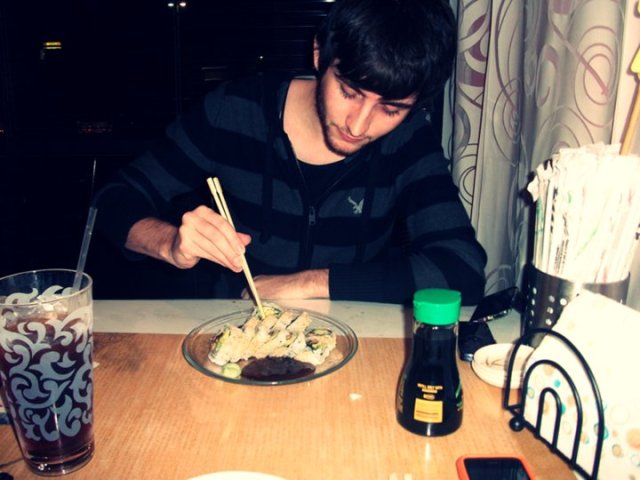These days, Japanese food is pretty widely consumed in the west, even if sometimes the original taste gets slightly lost in translation. In general, though, even non-Japanophiles can be found enjoying a range of Japanese food, whether at home or out for dinner with friends. Sushi is no longer shocking, and “comfort foods” such as okonomiyaki, ramen, and yakiniku can all be enjoyed overseas. But did you know that apparently we’re still making five major mistakes when it comes to Japanese cuisine? Read on to find out if you’re a major offender who doesn’t know their ikura from their elbow!
Madame Riri
Living in a foreign country has its trials and tribulations. There are all new customs and sometimes a new language you have to learn, creating a situation that can be really frustrating and depressing. Then one day you wake up, turn on the TV and suddenly, “Huh, I kinda get what’s going on here,” and you know you’re finally ready. It’s time to speak to the locals…with confidence!
In Japan, a very interesting thing happens though. You may speak close to native level and yet the Japanese person will respond back in ENGLISH. Has this happened to you?
“How do you feel when you speak fluent or reasonably good Japanese to a Japanese person and they insist on answering you in English?” Foreigners were asked this question on Japan Today and it was shared by Madame Riri, a Japanese blogger. What do both parties have to say about this? More after the jump!
The act of raising a child is never easy. Some countries offer parents enough rights and protections to make childcare a bit less of a burden, but the struggles and uncertainties that come with supporting another tiny human should never be disregarded.
That being said, everyone’s favorite opinionated Japanese blogger, Madame Riri, has a few things to say about how raising children in Japan is “ten times more difficult” than it is in foreign countries. Keep in mind that Madame Riri has only ever traveled to France and does not actually have any children of her own. But who knows? Perhaps there’s some truth buried beneath the mounds of limited observation, hearsay, and conjecture!




 Drift ice in Japan is a disappearing winter miracle you need to see now
Drift ice in Japan is a disappearing winter miracle you need to see now Which convenience store onigiri rice balls are the most popular? Survey reveals surprising results
Which convenience store onigiri rice balls are the most popular? Survey reveals surprising results Japan Extreme Budget Travel! A trip from Tokyo to Izumo for just 30,000 yen [Part 2]
Japan Extreme Budget Travel! A trip from Tokyo to Izumo for just 30,000 yen [Part 2] Starbucks Japan releases first-ever Hinamatsuri Girls’ Day Frappuccino
Starbucks Japan releases first-ever Hinamatsuri Girls’ Day Frappuccino Princesses, fruits, and blacksmiths: Study reveals the 30 most unusual family names in Japan
Princesses, fruits, and blacksmiths: Study reveals the 30 most unusual family names in Japan Development of Puyo Puyo puzzle game for use in nursing homes underway
Development of Puyo Puyo puzzle game for use in nursing homes underway Japanese restaurant chain serves Dragon Ball donuts and Senzu Beans this spring
Japanese restaurant chain serves Dragon Ball donuts and Senzu Beans this spring We brave fastballs from the world’s fastest (and most terrifying) pitching machine
We brave fastballs from the world’s fastest (and most terrifying) pitching machine Mt. Fuji climbing reservation website is now open, and here’s how to reserve your spot
Mt. Fuji climbing reservation website is now open, and here’s how to reserve your spot The world’s biggest Muji store opened in Hiroshima, and we went to check it out!
The world’s biggest Muji store opened in Hiroshima, and we went to check it out! Highest Starbucks in Japan set to open this spring in the Tokyo sky
Highest Starbucks in Japan set to open this spring in the Tokyo sky The 10 most annoying things foreign tourists do on Japanese trains, according to locals
The 10 most annoying things foreign tourists do on Japanese trains, according to locals Tokyo Skytree turns pink for the cherry blossom season
Tokyo Skytree turns pink for the cherry blossom season Yakuzen ramen restaurant in Tokyo is very different to a yakuza ramen restaurant
Yakuzen ramen restaurant in Tokyo is very different to a yakuza ramen restaurant Shibuya Station’s Hachiko Gate and Yamanote Line stairway locations change next month
Shibuya Station’s Hachiko Gate and Yamanote Line stairway locations change next month Starbucks Japan releases new sakura goods and drinkware for cherry blossom season 2026
Starbucks Japan releases new sakura goods and drinkware for cherry blossom season 2026 Starbucks Japan adds new sakura Frappuccino and cherry blossom drinks to the menu
Starbucks Japan adds new sakura Frappuccino and cherry blossom drinks to the menu Japan Extreme Budget Travel! A trip from Tokyo to Izumo for just 30,000 yen [Part 1]
Japan Extreme Budget Travel! A trip from Tokyo to Izumo for just 30,000 yen [Part 1] Japan’s new “Cunte” contact lenses aren’t pronounced like you’re probably thinking they are
Japan’s new “Cunte” contact lenses aren’t pronounced like you’re probably thinking they are Japan’s newest Shinkansen has no seats…or passengers [Video]
Japan’s newest Shinkansen has no seats…or passengers [Video] Foreigners accounting for over 80 percent of off-course skiers needing rescue in Japan’s Hokkaido
Foreigners accounting for over 80 percent of off-course skiers needing rescue in Japan’s Hokkaido Super-salty pizza sends six kids to the hospital in Japan, linguistics blamed
Super-salty pizza sends six kids to the hospital in Japan, linguistics blamed Starbucks Japan unveils new sakura Frappuccino for cherry blossom season 2026
Starbucks Japan unveils new sakura Frappuccino for cherry blossom season 2026 Foreign tourists in Japan will get free Shinkansen tickets to promote regional tourism
Foreign tourists in Japan will get free Shinkansen tickets to promote regional tourism Take a trip to Japan’s Dododo Land, the most irritating place on Earth
Take a trip to Japan’s Dododo Land, the most irritating place on Earth Naruto and Converse team up for new line of shinobi sneakers[Photos]
Naruto and Converse team up for new line of shinobi sneakers[Photos] Is China’s don’t-go-to-Japan warning affecting the lines at a popular Tokyo gyukatsu restaurant?
Is China’s don’t-go-to-Japan warning affecting the lines at a popular Tokyo gyukatsu restaurant? Survey asks foreign tourists what bothered them in Japan, more than half gave same answer
Survey asks foreign tourists what bothered them in Japan, more than half gave same answer Japan’s human washing machines will go on sale to general public, demos to be held in Tokyo
Japan’s human washing machines will go on sale to general public, demos to be held in Tokyo Starbucks Japan releases new drinkware and goods for Valentine’s Day
Starbucks Japan releases new drinkware and goods for Valentine’s Day We deeply regret going into this tunnel on our walk in the mountains of Japan
We deeply regret going into this tunnel on our walk in the mountains of Japan Studio Ghibli releases Kodama forest spirits from Princess Mononoke to light up your home
Studio Ghibli releases Kodama forest spirits from Princess Mononoke to light up your home Major Japanese hotel chain says reservations via overseas booking sites may not be valid
Major Japanese hotel chain says reservations via overseas booking sites may not be valid Put sesame oil in your coffee? Japanese maker says it’s the best way to start your day【Taste test】
Put sesame oil in your coffee? Japanese maker says it’s the best way to start your day【Taste test】 No more using real katana for tourism activities, Japan’s National Police Agency says
No more using real katana for tourism activities, Japan’s National Police Agency says Development of Puyo Puyo puzzle game for use in nursing homes underway
Development of Puyo Puyo puzzle game for use in nursing homes underway Japanese restaurant chain serves Dragon Ball donuts and Senzu Beans this spring
Japanese restaurant chain serves Dragon Ball donuts and Senzu Beans this spring We brave fastballs from the world’s fastest (and most terrifying) pitching machine
We brave fastballs from the world’s fastest (and most terrifying) pitching machine Mt. Fuji climbing reservation website is now open, and here’s how to reserve your spot
Mt. Fuji climbing reservation website is now open, and here’s how to reserve your spot The world’s biggest Muji store opened in Hiroshima, and we went to check it out!
The world’s biggest Muji store opened in Hiroshima, and we went to check it out! It’s like the samurai era never ended at this beautiful Japanese mountain town
It’s like the samurai era never ended at this beautiful Japanese mountain town Tokyo street sweets: The must-snack treats of Nakano’s Refutei
Tokyo street sweets: The must-snack treats of Nakano’s Refutei Satisfy your sweet tooth with cheesecake and more all-you-can-eat sweets at Cheese Garden
Satisfy your sweet tooth with cheesecake and more all-you-can-eat sweets at Cheese Garden Pokémon Ditto Cup uses Transform to turn into jiggly gelatin, rice, sand, and infinite possibilities
Pokémon Ditto Cup uses Transform to turn into jiggly gelatin, rice, sand, and infinite possibilities Hunter x Hunter teams up with Shimamura clothing chain for clothing and more treasures galore
Hunter x Hunter teams up with Shimamura clothing chain for clothing and more treasures galore Japanese drugstore sells onigiri at pre-stupid era prices, but how do they compare to 7-Eleven?
Japanese drugstore sells onigiri at pre-stupid era prices, but how do they compare to 7-Eleven? How to make curry in a rice cooker with zero prep work and no water[Recipe]
How to make curry in a rice cooker with zero prep work and no water[Recipe]